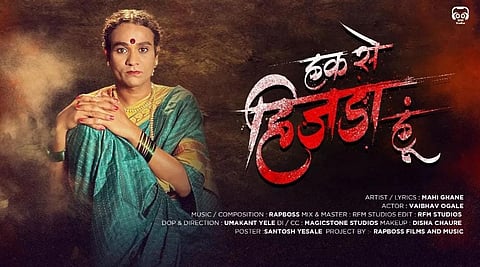
Mumbai- It is often said that art and politics are two sides of the same coin. Unfortunately, it has become a rare sight to see both coming together. Recently, Mahi G, a Marathi rap artist, released a song titled 'Haq se Hijda Hu,' delving into various aspects of the marginalized community. However, her artistic endeavours extend beyond this, as she consistently uses her platform to address a myriad of social issues, ranging from Adivasi culture to the Farmer's Protest.
When The Mooknayak spoke to Mahi G, the initial inquiry focused on her identity and how she envisioned the article’s bio. In response, she asserted, "Artist ki koi jaat nahi hoti" (artists do not belong to a specific identity). Despite this extraordinary perspective, the young artist has consistently emphasized addressing every structurally excluded identity in her work.
Talking about the inspiration behind her recent song ‘Haq Se Hijda Hu’, Mahi revealed, "When I travelled for college, I often noticed members of the Hijda community standing on platforms and bridges, relying on begging for their livelihood. Witnessing this practice within the community saddened me. Despite being revered by some, many would receive their blessings only to mock them when they turned away. The community's name had unfortunately become an insult. These encounters motivated me to create art that sheds light on their experiences."
The artist then talked about the process that has gone behind the emotional song. She said, "I penned the rap in 2022, but it was only recently released. The lyrics take a deep dive into the visibility of the Hijda community's identity, which, unlike other identities such as caste and religion, exposes them to significant discrimination owing to its apparent nature.” She further mentioned what she envisioned with her song, “through my music, my aim was to emphasize the importance of respecting their humanity above all other aspects of their identity. I didn't work in isolation; rather, I engaged with numerous individuals from the community. The Humsafar Trust played a crucial role in facilitating my interactions, and I even sang the initial drafts of my song to ensure that my words were not only kind but also truly representative of the community."
During the whole process, there was one story that stayed with the artist. Earnestly, she revealed the story to The Mooknayak. She said, “I encountered an individual whose personal journey and resilience deeply moved me. Originating from a family without a male figure, an uncommon scenario in our patriarchal society, they relied solely on their mother and recently married sister for support. As they discovered their true gender identity, conflicts arose within the family. They left their home and joined a gharana to fully embrace the Hijda community. Their livelihood depended on funds collected solely through begging. Despite winning the fight in self-acceptance, they faced another challenge- acceptance from the society. While attempting to visit their sister, they unfortunately were met with abuse and forced out of her home. Fortunately, they connected with individuals from the Humsafar Trust, who provided guidance. Now, they have stable employment and actively contribute to the trust's initiatives.”
The conversation then rerouted into her past and the reason behind her art. She claimed, “During my college days, I initially only wrote poetry, but my focus shifted to rap during the farmers' protest. I sensed a lack of interest in a movement that intensely impacted everyone. Rap, being highly popular among the youth, became a powerful medium to connect with the masses. In a country like India, where nearly half of the population is below 25, this genre of music can be instrumental in reaching out to a significant portion of the population.”
The artist has a number of feathers added to her hat. She has talked about many marginalised groups through her music. She added, “I debuted with my rap track 'Jungle Cha Raja,' shedding light on Adivasi culture and their way of life. Collaborating with Marathi artist Rapboss played an important role in bringing this project into the limelight. The song received positive responses, increasing my confidence. Another notable creation of mine is a song dedicated to Babasaheb Ambedkar, titled 'Baapmanus.' I had the privilege of performing it for the first time at JNU on the occasion of the iconic figure's birth anniversary.”
Also Read-
You can also join our WhatsApp group to get premium and selected news of The Mooknayak on WhatsApp. Click here to join the WhatsApp group.